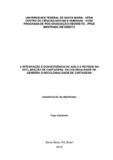| dc.creator | Baptistela, Tiago | |
| dc.date.accessioned | 2017-01-09 | |
| dc.date.available | 2017-01-09 | |
| dc.date.issued | 2016-06-30 | |
| dc.identifier.citation | BAPTISTELA, Tiago. INTEGRATION AND ASYLUM OF CONVERGENCE AND REFUGE IN THE DECLARATION OF CARTAGENA: GENEVA COLONIALITY THE CARTAGENA DECOLONIALIDADE. 2016. 78 f. Dissertação (Mestrado em Direito) - Universidade Federal de Santa Maria, Santa Maria, 2016. | por |
| dc.identifier.uri | http://repositorio.ufsm.br/handle/1/6406 | |
| dc.description.abstract | This work, which adopts the dialectical method, sought in his two chapters address the integration and convergence of asylum and refuge in the Cartagena Declaration, and its regional advances. Asylum and refuge institutes consolidated on the global agenda, through the Universal Declaration of Human Rights of 1948 and the Convention of the High Commissioner of the United Nations for Refugees, 1951. This building process took place in the architecture of the nation-state model representing a view of Eurocentric colonialism. Thus, the modern system of nation-state interferes in the agenda of human protection, the coloniality and Eurocentric vision of treating the subject, which historically legitimize a process of human rights restrictions on the State's interests. The Cartagena Declaration of 1984 may represent a process of Decoloniality of thought and sense of State in the regional context of Latin America, it extends the definition of refugee and recognizes the massive violation of human rights as refuge hypotheses. Thus, the spirit of Cartagena is the main regional political document whose parameters establish more comprehensive protection to people in vulnerable situations in the context of international human mobility, and includes in its definition the causes of asylum. The integration and convergence of asylum and refuge in the Declaration of Cartagena provides understand Decoloniality the classic model of treating protection of human beings, victims of international human mobility, because the definition of both institutes is bonded on the broad concept of refugee. Therefore, the process of Cartagena is the Decoloniality the Eurocentric conception of the asylum and refuge, and makes it possible to expand the protection of the human person, whose achievements are conditional on political will of the Latin American states. | eng |
| dc.format | application/pdf | por |
| dc.language | por | por |
| dc.publisher | Universidade Federal de Santa Maria | por |
| dc.rights | Acesso Aberto | por |
| dc.subject | Asilo e refúgio | por |
| dc.subject | Declaração de Cartagena | por |
| dc.subject | Integração e convergência | por |
| dc.subject | Asylum and refuge | eng |
| dc.subject | Cartagena declaration | eng |
| dc.subject | Integration and convergence | eng |
| dc.title | A integração e convergência do asilo e refúgio na Declaração de Cartagena: da colonialidade de Genebra à decolonialidade de Cartagena | por |
| dc.title.alternative | Integration and asylum of convergence and refuge in the Declaration of Cartagena: Geneva coloniality the Cartagena decolonialidade | eng |
| dc.type | Dissertação | por |
| dc.description.resumo | O tema central do presente trabalho é a análise da integração e da convergência dos institutos do asilo e do refúgio na Declaração de Cartagena. Os institutos do asilo e refúgio consolidaram-se na agenda global, por meio da Declaração Universal dos Direitos Humanos de 1948 e a Convenção do Alto Comissariado das Nações Unidas para Refugiados de 1951, mas é na Declaração de Cartagena que eles adquirem uma maior relevância na perspectiva dos países latino-americanos. Esse processo demonstra a superação da visão eurocêntrica sobre o tema e a emergência de uma visão decolonial sobre o mesmo. Este avanço é fruto da maior preocupação da América Latina, após um longo e duro ciclo político autoritário, com a proteção dos direitos humanos para além dos Estados soberanos. É por isso, que a Declaração de Cartagena amplia a definição de refugiado e reconhece a sua possibilidade diante da ameaça de violação dos direitos humanos. Desta forma, é possível afirmar que o espírito de Cartagena impulsionou uma forma avançada de proteção das pessoas em situação de vulnerabilidade no contexto da mobilidade humana internacional, além de incluir na sua definição as causas do asilo. A integração e convergência do asilo e refúgio na Declaração de Cartagena possibilita, assim, a compreensão de como o pensamento decolonial pode impulsionar a formação de um novo parâmetro para a proteção da mobilidade humana internacional no caso conflito político e de ameaça aos direitos humanos. Portanto, a Declaração de Cartagena supera a concepção eurocêntrica sobre os institutos abordados e possibilita uma proteção mais ampla aos direitos humanos na situação de conflitos políticos. A análise do tema e suas implicações é feita utilizando-se o método dialético. | por |
| dc.contributor.advisor1 | Redin, Giuliana | |
| dc.contributor.advisor1Lattes | http://lattes.cnpq.br/2298217007407061 | por |
| dc.contributor.referee1 | Silva, Maria Beatriz Oliveira da | |
| dc.contributor.referee1Lattes | http://lattes.cnpq.br/9250920062835623 | por |
| dc.contributor.referee2 | Bedin, Gilmar Antonio | |
| dc.contributor.referee2Lattes | http://lattes.cnpq.br/0553982956028307 | por |
| dc.creator.Lattes | http://lattes.cnpq.br/8316746681553179 | por |
| dc.publisher.country | BR | por |
| dc.publisher.department | Direito | por |
| dc.publisher.initials | UFSM | por |
| dc.publisher.program | Programa de Pós-Graduação em Direito | por |
| dc.subject.cnpq | CNPQ::CIENCIAS SOCIAIS APLICADAS::DIREITO | por |


